The Surprising Lessons I Learned From Eating Like a French Person for a Week
I have personally found this to be true for me—though I recognize it does not cause inflammation for everyone—so I've done my best to minimize how much gluten and dairy I eat. Plant-based foodies like Taline Gabrielian and McKel Kooienga, RD, making finding recipes easy, but whenever I see a photo of a buttery croissant or a baguette and Brie, it makes me a little bit nostalgic for the days when my eating habits were less regimented.
If a Parisian can maintain a glowing complexion and a clean bill of health while still enjoying rich foods on the reg, why can't I?
Deep down, I still want to believe there's a way to have it all—I mean, if a Parisian can maintain a glowing complexion and a clean bill of health while still enjoying rich foods on the reg, why can't I? So I decided to give my diet a complete 180, eat like a French person for a week, and see how it would affect me. (Hey, it's a tough job, but all in the name of journalism.)
- Chloe Vichot, Chloe Vichot is the owner of Ancolie, a casual restaurant in New York City.
- Frances Largeman-Roth, RD, registered dietitian and author of Smoothies & Juices: Prevention Healing Kitchen
- Vanessa Chalmé, RDN, CDN, Vanessa Chalmé, RDN, CDN, is a registered dietitian and founder of Nutrition Energy. She splits her time between the U.S. and France.
Would doubling down on pastries and cheese keep me satiated and productive? Or would they make me bloated and give me brain fog? Keep reading to find out.
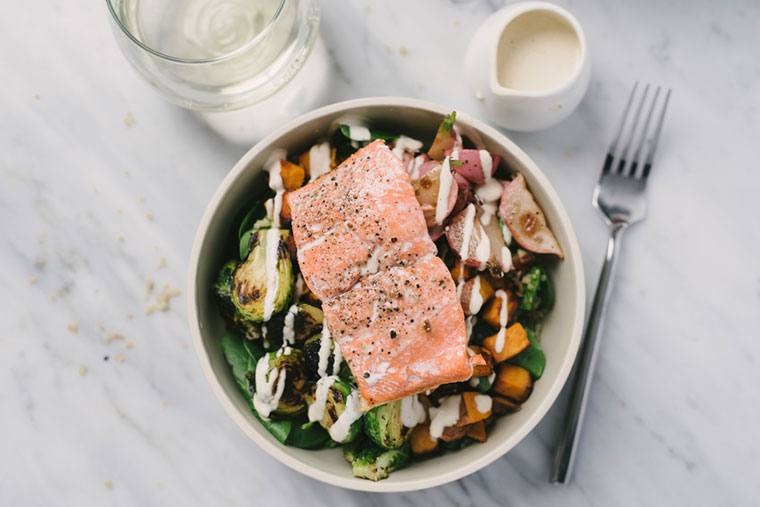
What is the French diet and what are the benefits?
Before buying out all the baguettes at my local market, I figured it was a good idea to actually ask a French dietitian about what the French diet actually is. I consulted Nutrition Energy founder Vanessa Chalmé, RDN, CDN, who is from France and now splits her time between the U.S. and her home country.
Chalmé tells me that it's more accurate to think of eating the French way as a lifestyle, not a "diet" per se. "The French way of eating is an experience," she says. "You eat as much with your eyes as with your mouth. It is also an intuitive form of eating, where you listen to your body and its inner cues. You not only feed your body but your mind."

{{post.sponsorText}}
Chalmé says when you eat the French way, you gravitate toward eating minimally processed foods—which end up being more satiating than the highly processed foods that tend to be popular in the U.S. This means your plate will be filled with foods that are nutrient-rich and you also won't have to eat as much to feel full. In order to truly eat the French way, she was several tips, which she shares next.
Tips for following the French diet
1. Eat in-season produce.
Chalmé says that in France, in-season fruits and vegetables play a starring role in the French diet. Instead of buying a whole week's worth of groceries from a supermarket, most French people go to local markets a few times a week to pick up fresh food. "When in-season fruits and vegetables are the focus on your meals, you'll consume lots of vitamins, minerals, fiber, and antioxidants," she says.
2. Incorporate dairy into your meals.
Here in the States, dairy has pretty much been pushed off the table by the army of alternative milks and yogurts, but Chalmé says it's a major part of French eating, and as a dietitian, she's into it. "Yogurt, cheese, and milk provide calcium and healthy fats," she says. Dairy is also full of probiotics, which is good for the gut.
3. Fish, nuts, and plant oils are all consumed regularly.
According to Chalmé, healthy fats also come in the form of fish, nuts, and plant oils (like olive oil), which are all eaten on a regular basis in France. These foods are full of brain- and heart-healthy omega-3s.
Watch the video below to see more reasons why olive oil is so healthy:
4. Portions are moderate.
Another difference between French eating and American eating according to Chalmé is that portions are smaller in France. "Even produce found in nature, like fruits, are smaller," she says. "The advantage of smaller portions means more diversity and variety in your meals. You can have a starter, a main course, and even a dessert and you won’t feel stuffed." She says the emphasis is on quality, not quantity. "French love the expression 'less is more'— not in the sense of less food, but better food," she says. "Eating is supposed to be a pleasant experience and overeating defeats that purpose."
5. Food is about pleasure.
Chalmé emphasizes that eating is an all-out experience in France. French people aren't ones to be mindlessly eating a bag of chips while working on their laptop. She says it's a full-on sensory experience and the focus is on enjoying what's on the plate in front of you.
How I put the tips into practice for my week of eating the French way
To more insight on how to integrate Chalmé's tips, I called Ancolie restaurant owner Chloe Vichot, a New York transplant by way of France. I wanted to know what French eating actually looked like on a day-to-day basis. For Vichot, the first meal of the day is heavy in carbs, sugar, and caffeine. (Gasp!) "I typically have coffee and a chocolate croissant for breakfast, or maybe some toast and jam," she says.
Vichot has a piece of chocolate cake. Every. Single. Day. "And no, I don't feel bad about it," she emphasizes.
She echoes Chalmé in saying that French people aren't big snackers—unlike us Americans—but they are strong believers in a lunch break. Instead of eating over a computer at work, everyone goes out and typically eats a dish with protein, grains, and lots of vegetables. This could be in the form of a chicken sandwich loaded with veggies, or fish, rice, and salad.
She tells me dinner is similar, just a bigger portion. Oh, and Vichot has a piece of chocolate cake. Every. Single. Day. "And no, I don't feel bad about it," she emphasizes.
Some other guidelines she gave me that synch up with Chalmé's tips: No processed food or candy, but a glass of wine at dinner—or even lunch—is totally encouraged. Hanging up the phone, I smiled to myself. This was going to be the easiest article to research and write, ever.
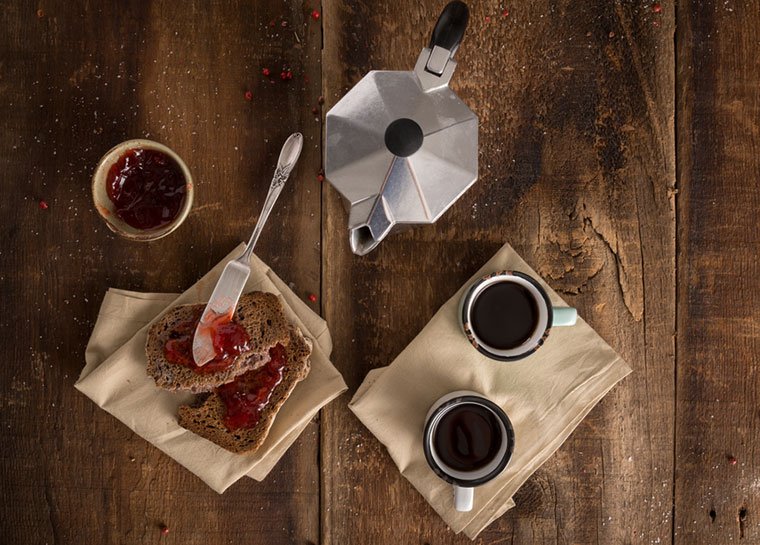
Sweet beginnings
I eased into the first meal of my new eating plan with a slice of toast and some banana-strawberry jam. Normally, I'd freak out about how much sugar I was scarfing down, but it didn't seem very French to analyze a nutrition label. My first thought? This is much more delicious than my usual bowl of oatmeal.
For lunch, I made myself salmon, salad, and quinoa, but for dinner I had the very American meal of leftover Chinese takeout. I had to make room in the fridge for all my new French food, I rationalized. So far, I didn't notice too much of a change in the way I felt, other then the excitement of spending the week eating all the things I had been avoiding.
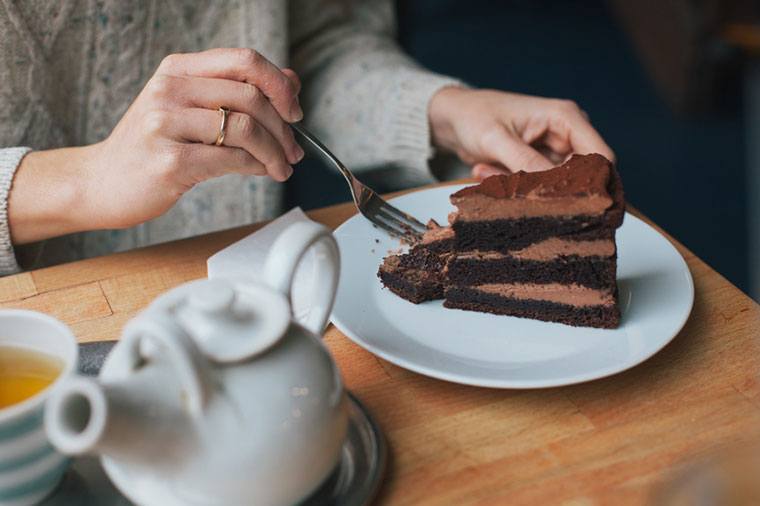
Bring on the chocolate
On my way to work the next day (I did this experiment pre-pandemic), I ordered a big, flaky croissant from my corner café—something I'd eye every day while ordering my almond milk latte, but wouldn't dream of buying. When I got to work, I quickly pulled it out of the wax wrapper and took a satisfying bite, ignoring the envious stares my coworkers were giving me. (Hey, you try eating a pastry in a room full of health editors.) Two thoughts immediately entered my mind. First, This is seriously better than oatmeal. And then, Okay, croissants are definitely not meant to be eaten over a keyboard. Flakes everywhere.
Usually I have a mid-morning snack, but the croissant held me over until lunch. (Surprising, because there isn't any protein in it.) Keeping with the French lunch-break mentality, I met a friend and ordered a quiche and farro salad. I usually have another snack in the late afternoon, but I held out until dinner—a homemade croque madame, followed by a big, honking piece of chocolate cake and a glass of red wine. French people know how to live, I thought, licking my fork.
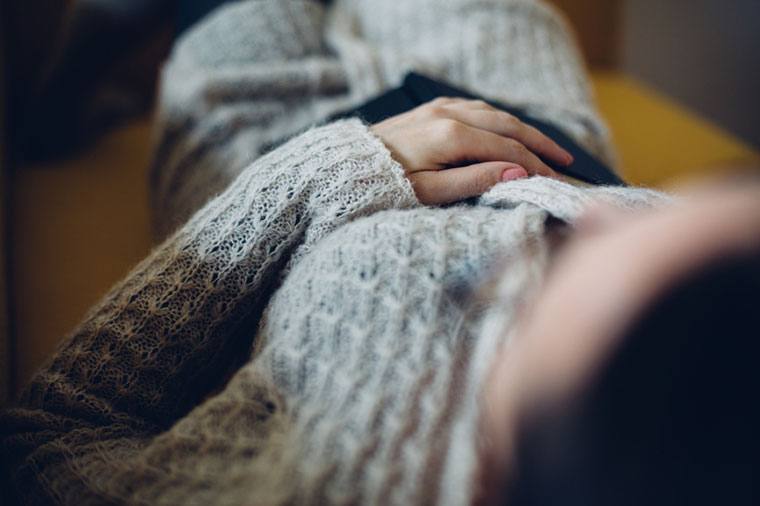
Hey, French people—are you all bloated?
I woke up the next morning already thinking of my breakfast croissant, but I also felt really, well, bloated. My body was definitely not used to all this cheese and gluten. But did that deter me? No. I still got that fluffy croissant.
When lunch rolled around—quinoa, grilled chicken, and salad brought from home—I asked one of my work friends to take a break and eat with me. Her response: "Can I bring my laptop so I can answer emails at the same time?" Okay, so we haven't exactly perfected the lunch break here in America.
There certainly isn't anything glamorous about eating like a French woman when you feel bloated and uncomfortable.
Despite feeling puffy all day, I went all out with dinner, making chicken cordon bleu—with lots of Swiss cheese—and a big salad. I was rewarded for sticking to my French diet by waking up the next morning sick to my stomach. Now, instead of a croissant, all I wanted was my usual bowl of oatmeal, which I did end up making. Because I had a stomach ache, I skipped lunch, and when I met a friend for dinner, I just picked at my salad.
There certainly isn't anything glamorous about eating like a French woman when you feel uncomfortable. I decided not to finish out the week on a diet that was clearly disagreeing with my body. And as soon as I went back to my normal way of eating, with virtually no dairy or gluten, I immediately felt better.
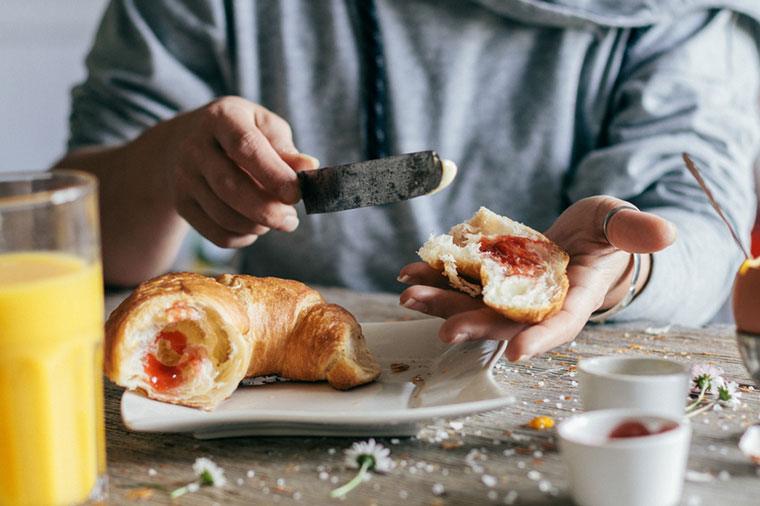
Is eating a French diet healthy?
The next day, I called nutritionist Frances Largeman-Roth, RD. I had some big questions for her—like, why did the French diet make me so sick? "It was probably a shock to your body if you are used to eating so much cheese and gluten," she tells me. "But for someone who grows up eating those foods, it isn't anything new, so it wouldn't affect them the same way." So French people aren't walking around with stomachaches. Good to know.
I also asked her why a croissant sustained me just as much as a protein-rich breakfast. "A croissant has about 400 calories, which is enough to give you energy for a few hours," she says. But sadly, Largeman-Roth doesn't endorse a croissant-a-day habit. "Over time your body will adjust, and then you might start crashing because of the lack of protein."
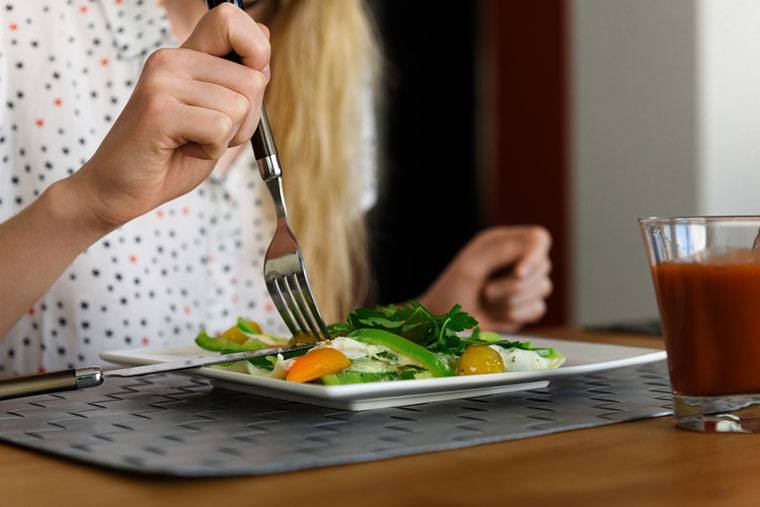
Despite her qualms with a.m. pastries, Largeman-Roth says the French way of eating actually is healthy. When you're consuming smaller portions, not snacking, and avoiding processed foods, it balances out those rich, high-quality desserts and moderate amounts of wine. Plus, the typical French lunch and dinner includes a good mix of protein, healthy fats, veggies, and grains, which we should all be shooting for.
Bottom line: Eating like a Frenchwoman all the time just didn't work for my body. But I'm glad to know that if I want to have a croissant or some chocolate cake every now and then, I don't have to stress. In fact, eating things that make you happy might just be one of the most nourishing things of all. Très bien!
Originally published April 6, 2017. Updated May 4, 2021.
Oh hi! You look like someone who loves free workouts, discounts for cult-fave wellness brands, and exclusive Well+Good content. Sign up for Well+, our online community of wellness insiders, and unlock your rewards instantly.
Loading More Posts...